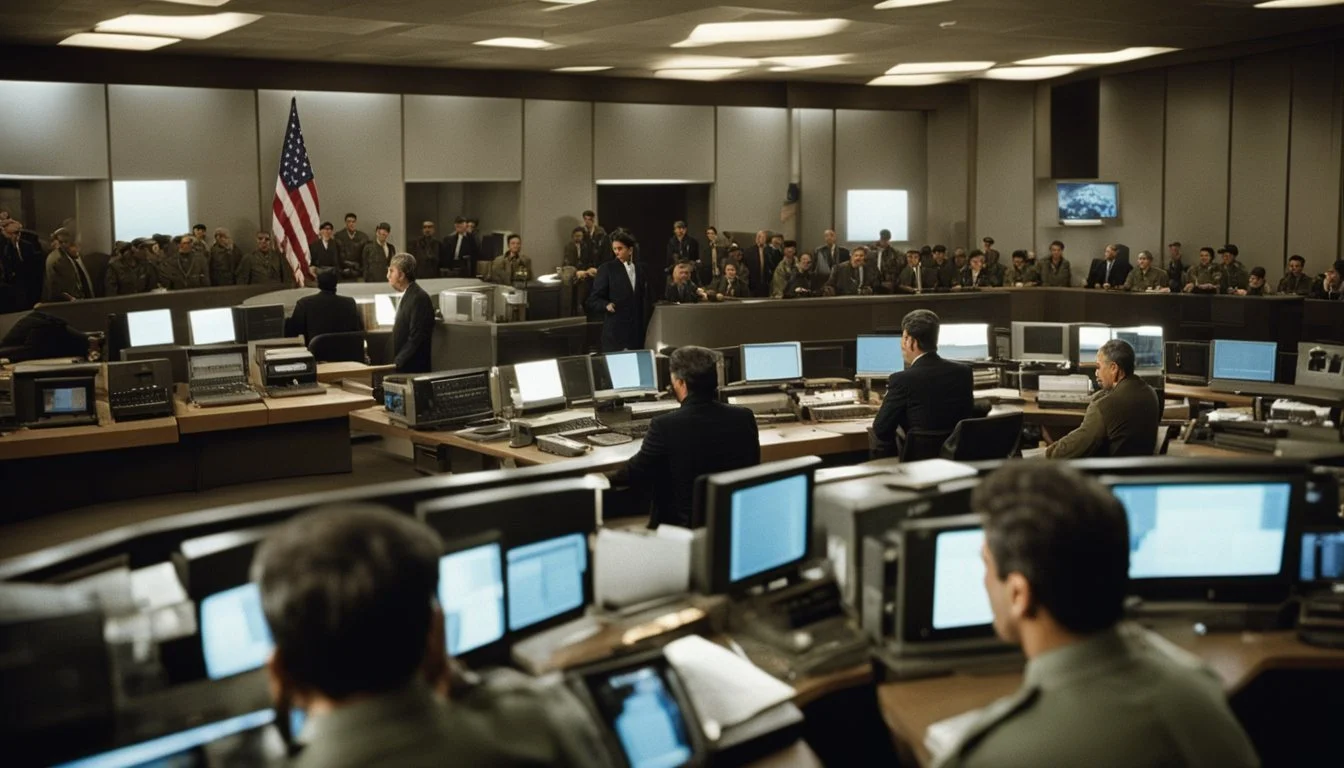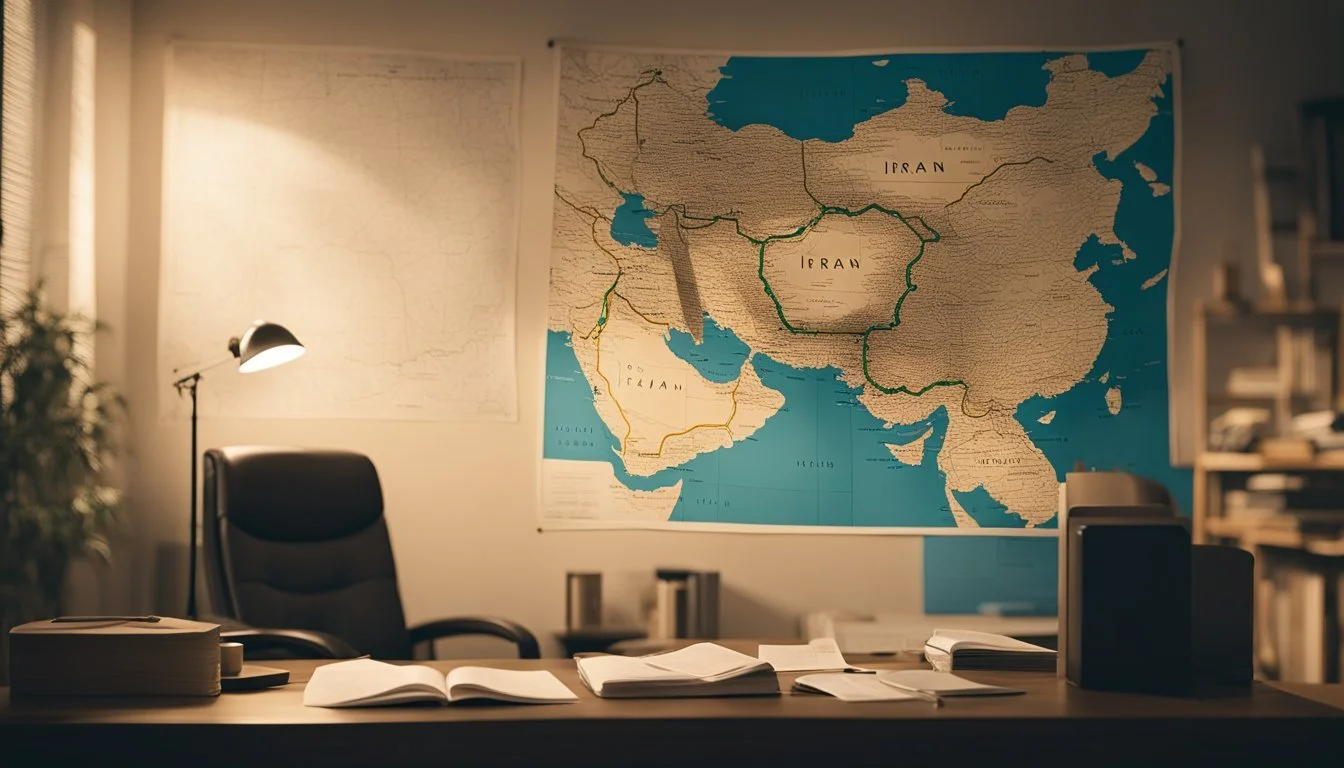12 Films Investigating the Iran-Contra Affair and its Aftermath
A Critical Exploration
The Iran-Contra Affair remains one of the most controversial political scandals in U.S. history, involving secret arms sales to Iran and the illegal funding of Nicaraguan Contra rebels. Films capturing this event delve into the intricate web of covert operations, government deception, and political intrigue that defined the 1980s.
These films not only provide a historical perspective on the scandal but also explore its long-term implications on American politics and government transparency. From documentaries to dramatizations, each film offers a unique lens through which to examine the multifaceted nature of the Iran-Contra Affair and its enduring impact on the nation's conscience.
1) Iran-Contra: Reagan's Scandal and the Unseen Fallout
The Iran-Contra affair surfaced in 1986 involving secret arms sales to Iran and funneling funds to Contra rebels in Nicaragua. This scandal implicated several high-ranking officials in Reagan's administration.
President Ronald Reagan himself was questioned, though he was never charged. His administration faced significant scrutiny over the illegal activities.
In 1992, President George H. W. Bush pardoned several individuals involved, effectively ending the legal investigations. This preemptive move shielded many from full accountability.
The scandal had far-reaching impacts, including damage to U.S. credibility. It exposed vulnerabilities in presidential power and covert operations.
More about the documentary here (1992).
2) Aftermath: The Legacy of Iran-Contra in American Politics
The Iran-Contra affair had a lasting impact on American politics. It revealed the extent of covert operations and the executive overreach that can occur within the United States government.
Key figures like Oliver North and John Poindexter faced legal battles, but their convictions were later overturned on technicalities. This led to debates over accountability and the checks and balances in the political system.
The scandal raised questions about presidential authority in foreign policy. Proponents of presidential preeminence argued for a strong executive branch, while opponents highlighted the dangers of an "imperial" presidency.
The affair also influenced public perception of governmental transparency and truthfulness. President Ronald Reagan's initial denials followed by admissions left a mark on the credibility of the administration.
Debates on the constitutional implications of the Iran-Contra affair continue to resonate, affecting how future administrations approach foreign policy and covert operations. The affair is often cited in discussions about the balance of power between the executive and legislative branches.
It remains a significant reference point in American political history, illustrating the complexities and consequences of clandestine governmental actions.
3) Oliver North: The Man Behind the Iran-Contra Affair
Oliver North, born on October 7, 1943, is an American political commentator, television host, and retired Marine Corps lieutenant colonel.
He gained national attention during the Iran-Contra affair of the late 1980s while serving as a National Security Council staff member.
North played a key role in this political scandal, which involved the illegal sale of weapons to Iran.
The objective was to fund Nicaraguan Contra rebels, bypassing Congress.
North's actions were seen as a breach of trust and law.
He was later indicted on multiple charges, including obstruction and destruction of documents.
Despite this, many of the convictions were vacated on appeal.
North's involvement turned him into a controversial figure.
In 1991, he co-authored "Under Fire: An American Story," detailing his perspective on the scandal.
In 1994, he ran unsuccessfully for Senate as a Republican candidate in Virginia.
North continues to be a notable figure in American politics and media.
More on Oliver North can be found here.
4) The Cover-Up: How Iran-Contra Was Kept Secret
The Iran-Contra affair involved secretive and illegal activities carried out by senior officials in the Reagan Administration. The plan aimed to fund the Contras in Nicaragua despite a congressional ban and involved selling arms to Iran.
The cover-up began with the manipulation of official documents and the destruction of evidence. Officials created misleading memos and falsified records to throw off investigators and the public.
Key players, such as Oliver North and John Poindexter, were involved in orchestrating the deceit. They used private networks and obscure channels to avoid detection and accountability.
Congressional hearings revealed the extent of the cover-up, but only after significant portions had already reached the media. A coordinated effort helped in maintaining secrecy for a considerable period.
This systematic attempt to suppress the truth was also aided by the withholding of information from Congress and the public. Reports were incomplete or deliberately vague to obscure the covert operations.
To delve deeper into how the Iran-Contra affair was kept secret, the documentary "Cover Up: Behind the Iran Contra Affair" (1988) provides an insightful look into these mechanisms. For more information, visit the film’s IMDb page.
5) Congressional Hearings: The Iran-Contra Investigation
The congressional hearings on the Iran-Contra affair were a pivotal moment in U.S. political history. Conducted by joint committees from the House of Representatives and the Senate, the hearings began in May 1987 and concluded in August of the same year.
These hearings aimed to investigate the clandestine operation where the U.S. sold missiles to Iran in exchange for hostages held in Lebanon. The proceeds from these sales were funneled to support Contra rebels in Nicaragua, despite a congressional ban on further U.S. aid to the Contras.
Key figures testified, including Lieutenant Colonel Oliver North, who admitted to shredding documents related to the operation. His testimony was especially dramatic and garnered significant media attention.
Senator Daniel Inouye (D-HI) played a significant role during the hearings, often questioning the legality of the actions taken by the officials involved. His remarks and probing questions became iconic.
The televised nature of the hearings brought unprecedented public scrutiny and transparency to government operations. They were broadcast live on major networks, emphasizing the importance and gravity of the situation.
The final report was released in November 1987, documenting the findings and outlining the misconduct uncovered. This report served as a crucial record of the events and the failure of governmental oversight during the affair.
The hearings led to various legislative and administrative changes, intended to prevent such clandestine operations in the future and enhance congressional oversight of foreign policy initiatives.
6) Whistleblowers: Voices Against the Iran-Contra Scandal
The Iran-Contra Affair unraveled partly due to courageous whistleblowers who brought hidden activities to light. "Cover Up: Behind the Iran-Contra Affair" (1988) explores this theme, showcasing insights from insiders exposing governmental misconduct. IMDB
"The Pentagon Wars" (1998) takes a satirical look at whistleblowing within the military-industrial complex, indirectly reflecting the challenges of the Iran-Contra Affair. IMDB
"Silence Patton" (2011) includes references to whistleblowers who challenged official narratives, drawing parallels to the bravery shown during Iran-Contra. IMDB
In "Shadow Government" (2009), the intricate operations that led to the Iran-Contra Affair are unveiled, with a focus on those who dared to reveal the truth. IMDB
"Secret Wars: The Contras, Cocaine, and Covert Operations" (1998) investigates the controversial operations funded secretly, highlighting whistleblowers’ roles in exposing illegal actions. IMDB
"American Made" (2017) portrays characters inspired by real whistleblowers who risked everything to uncover the truth behind covert activities during the Iran-Contra era. IMDB
7) The Tower Commission Report: Investigating Iran-Contra
The Tower Commission was established by President Ronald Reagan in response to the Iran-Contra Affair. Its main goal was to investigate the secret arms sales to Iran and the diversion of funds to Nicaraguan Contras.
The Commission was chaired by former Senator John Tower. The report examined the roles of key officials and assessed the National Security Council’s effectiveness during the affair.
Released in 1987, the Tower Commission Report found significant deficiencies in the management of the National Security Council. It pinpointed communication failures and lack of oversight as major issues.
The report indicated that President Reagan had little direct involvement but criticized his administration for inadequate supervision. The findings led to significant changes in U.S. national security operations.
For more information on the Tower Commission, you can visit Wikipedia.
8) Media's Role: Unveiling the Iran-Contra Affair
The media played a pivotal role in bringing the Iran-Contra Affair to public attention. Through investigative journalism, films, and documentaries, the scandal was uncovered and scrutinized.
Journalists and filmmakers connected dots and presented information that posed difficult questions to the government. Early media exposure involved stories about U.S. ties to the Contras, prominently features in publications like the Miami Herald.
Documentaries like COVER UP: Behind the Iran Contra Affair (1988) delved deep into the scandal, presenting facts and footage that revealed the intricacies of the affair. IMDB
The movie The Last Thing He Wanted (2020) portrayed a fictionalized account inspired by the true events of the Iran-Contra Affair, focusing on a journalist's dangerous quest for truth. IMDB
Archival footage, such as those from C-SPAN's coverage of Congressional hearings, provided firsthand insights into the testimonies and reactions of key figures like Senator Daniel Inouye. C-SPAN Classroom
These media efforts not only informed the public but also maintained pressure on officials to reveal the full extent of the U.S. government's involvement in the scandal. Through diverse formats, the media ensured the Iran-Contra Affair remained a significant topic of public discourse.
9) The CIA's Involvement in Iran-Contra
The Central Intelligence Agency played a critical role in the Iran-Contra Affair, mainly through its covert operations and support for the Contras in Nicaragua. The agency facilitated arms sales to Iran, with profits directed to fund Contra rebels who were fighting the Sandinista government.
This strategy involved complex logistics and secretive dealings, often bypassing congressional oversight. Key figures in the CIA were deeply involved in orchestrating these operations, ensuring weapon transfers and funding channels remained discreet.
One well-documented aspect of the CIA's involvement was its logistical support and intelligence sharing with the Contras. The agency provided training, supplies, and crucial battlefield intelligence to aid the anti-communist forces in their efforts against the Nicaraguan government.
Furthermore, the Iran-Contra hearings revealed that the CIA frequently collaborated with Lt. Col. Oliver North and other National Security Council members. This close cooperation indicated a broader government effort to conduct foreign policy outside established legal frameworks.
To discover more about the depth of the CIA’s role, "Frontline: The Secret Government – The Constitution in Crisis" (1987) offers a comprehensive look at these clandestine operations. IMDB
10) Iran-Contra: Impact on US Foreign Policy
The Iran-Contra Affair had significant repercussions on US foreign policy. The scandal unfolded in the mid-1980s when it was revealed that senior officials secretly facilitated the sale of arms to Iran, which was under an arms embargo.
This covert operation was aimed at using the proceeds to fund Contra rebels in Nicaragua, despite Congressional prohibitions.
The affair highlighted the tension between the executive and legislative branches. Congress was left out of critical decisions, showing a lack of control over foreign policy by elected representatives. This breach of transparency eroded trust in government actions.
US foreign policy became more cautious post-scandal. There was a notable shift toward greater oversight to prevent similar unauthorized actions. The Iran-Contra affair sparked extensive legal and policy reforms, reinforcing checks and balances.
Internationally, America's credibility took a hit. Allies questioned the reliability of the US, given its secret and contradictory policies. This skepticism affected diplomatic relations and negotiations for years.
The scandal also showcased the complexity of Cold War politics, where ideological battles led to convoluted and sometimes illegal strategies. The Iran-Contra affair serves as a reminder of the ethical and legal boundaries that define responsible governance.
11) The Middle East Connection in Iran-Contra
The Iran-Contra Affair entwined deeply with Middle Eastern geopolitics. Central to the scandal was Iran's covert request for American arms during the Iran-Iraq War. Despite an official embargo, U.S. officials facilitated arms sales to Tehran, aiming to secure hostage releases.
Role players included Lebanese intermediaries, facilitating secret communications between the U.S. and Iran. These negotiations underscored the intricate web of Middle Eastern politics.
The affair spotlighted U.S. foreign policy contradictions. Publicly, the U.S. opposed Iranian influence. Secretly, officials engaged with Iran, highlighting the region's geopolitical complexities.
For further information on the Iran-Contra Affair, read more on Wikipedia.
12) The Legal Repercussions of Iran-Contra
The Iran-Contra affair had significant legal repercussions that unfolded over many years.
In December 1986, U.S. Attorney General Edwin Meese requested the appointment of an independent counsel to investigate the matter. Lawrence Walsh, a former judge and deputy attorney general, was appointed to this role. He led extensive investigations into the affair.
Numerous individuals faced legal action. Several key figures were indicted, including National Security Advisor John Poindexter and Lieutenant Colonel Oliver North. Poindexter was convicted on multiple charges, but his convictions were later vacated on appeal.
Oliver North was convicted of three charges: accepting an illegal gratuity, aiding and abetting in the obstruction of a congressional inquiry, and destruction of documents. However, his convictions were also vacated on appeal due to concerns over immunity he was granted for his congressional testimony.
Former Secretary of Defense Caspar Weinberger was indicted on charges of lying to Congress. He received a pardon from President George H.W. Bush before his trial could proceed. Other figures involved in the affair were also pardoned around this time.
These legal battles highlighted the complexities and challenges of prosecuting government officials. The investigations revealed significant breaches of U.S. law, sparking debates about accountability and executive power.
For further details on the films that explore this aspect of the Iran-Contra affair, refer to the following list:
Historical Background
The Iran-Contra Affair was a covert operation during the 1980s that involved high-level U.S. government officials facilitating arms sales to Iran, with profits partly funding Nicaraguan Contra rebels. Critical components include its origins and the key figures involved.
Origins of the Iran–Contra Affair
The roots of the Iran-Contra Affair can be traced back to two separate but interconnected geopolitical crises.
Firstly, the U.S. had a stake in countering Marxist influence in Central America. The Sandinista government in Nicaragua, which came to power in 1979, was viewed with suspicion by the Reagan administration. The U.S. began supporting the Contra rebels, who opposed the Sandinistas.
Concurrently, the situation in the Middle East was unstable. In 1980, the Iran-Iraq War broke out, straining relationships and creating a dynamic power struggle in the region. Amid this chaos, Iranian-backed Hezbollah took American hostages in Lebanon, prompting U.S. efforts to negotiate their release.
Key Figures Involved
Many individuals played crucial roles in the Iran-Contra Affair. President Ronald Reagan's administration was deeply involved, with significant contributions from several key personalities.
Ronald Reagan: The U.S. President at the time, who authorized covert operations.
Oliver North: A National Security Council staff member, direct organizer of the operations.
John Poindexter: Reagan’s National Security Advisor, signed off on key decisions.
Edwin Meese: U.S. Attorney General, who requested the independent counsel to investigate the affair.
Lawrence Walsh was later appointed as the independent counsel to lead the investigations, adding to the legal aftermath and broader historical understanding of the incident.
Impact and Consequences
The Iran-Contra Affair had significant political and legal repercussions, shaping the landscape of U.S. governance and international relations. It resulted in notable political fallout and considerable legal actions that impacted many individuals involved.
Political Repercussions
The Iran-Contra Affair led to severe political fallout for the Reagan Administration. President Ronald Reagan faced intense scrutiny and a temporary drop in approval ratings. Congressional hearings showcased the government's covert operations, causing widespread public distrust in the administration.
The use of a joint Senate-House Committee to investigate highlighted the need for increased oversight. It also emphasized the legislative branch's power to hold the executive branch accountable. Various political figures involved, including key White House staff, were reprimanded, shifting the dynamics of political accountability in the U.S.
Legal Outcomes
The legal outcomes of the Iran-Contra Affair were profound. United States Attorney General Edwin Meese III requested the appointment of an independent counsel, resulting in Lawrence Walsh taking on the investigation. Walsh’s extensive inquiry led to multiple indictments and convictions of key figures, including high-ranking officials.
Many convicted individuals received pardons from President George H. W. Bush, raising debates on justice and executive power. The legal proceedings established precedents for how future political scandals would be investigated and prosecuted, leaving a lasting impact on American legal and political systems.







